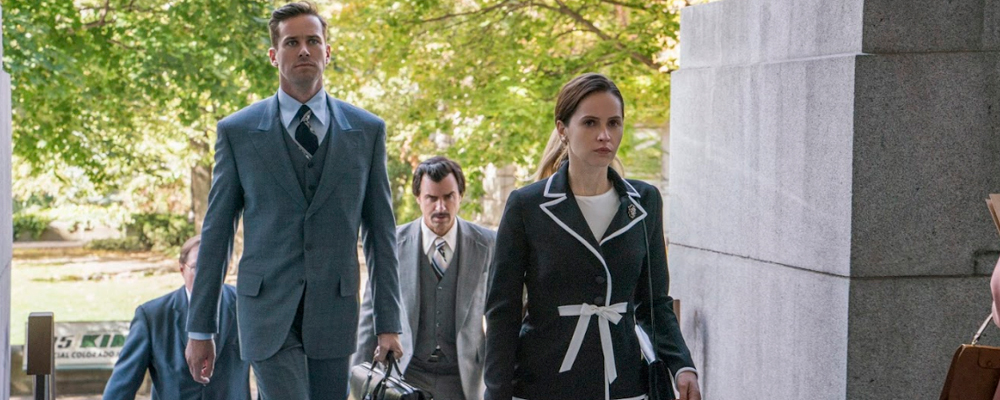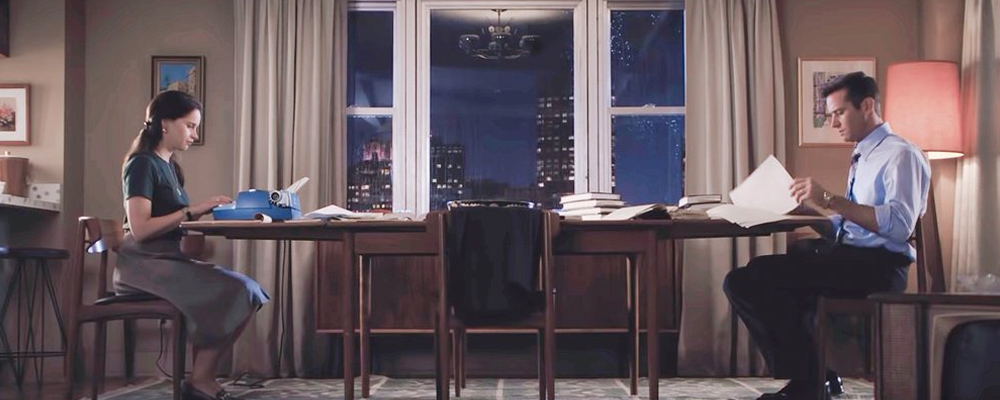Director Mimi Leder and Armie Hammer Dug Deep Into the Life and Times of Ruth Bader Ginsberg for ‘On the Basis of Sex’
Alci Rengifo
It is never easy being a pioneer. “On the Basis of Sex” recounts how Ruth Bader Ginsburg challenged the gender discriminative laws that defined much of American society for generations. Felicity Jones plays Ginsburg as a strong-willed, impressive intellect who manages to juggle law school, marriage and child-rearing as she makes her name as a professor and litigator. Life is made bearable because of her extraordinary husband Martin. As played by Armie Hammer , Martin is apparently the greatest husband of all time, capable of cooking, cleaning, child-caring and being a brilliant lawyer himself. When Ginsburg comes across a case involving sexual discrimination of a man, she decides this is her chance to take on the system and make a stand for equality.
Directed by Mimi Leder, who herself has risen in an industry dominated by males, “On the Basis of Sex” is a feel-good message movie. It never pretends to be iconoclastic. It wants to celebrate Ginsburg and what she represents culturally. Leder and Armie Hammer took some time to sit down with Entertainment Voice and discuss turning real life into an inspiring film.
Let’s start with you Mimi, when did you decide to take on this project?
Leder: Well, my manager, agent at the time, John Levin, sent it to me. I read it immediately. I knew I had to make this movie. I felt an instant connection to RBG, I always knew about Justice Ginsburg and who she was and her role in the Supreme Court. But I never really knew about her in a personal way. Once I did, I just felt I had to tell her story and that I was uniquely qualified in a way, because I felt I had commonalities with RBG, in different worlds that we live in. Obviously I won’t compare my accomplishments to hers, hers are so much greater. But in a different generation, we’re both Jewish, we’re both mothers, we both have long-standing marriages and have broken the glass ceiling in our own ways. We both know on different levels what it means to make change. This movie is about how change happens.
Things are starting to change slowly in the industry. But there’s still this reality that the movie world has been dominated for so long by men.
Leder: Yes, very much so. It’s still dominated by males in our business. Between 2008 and 2018 seven percent of the films made in that time were made by women, seven percent. That’s low. We’ve come a long way but have a long way to go.
And making this kind of film has a special challenge, because these are real people. Armie, how did you prepare to interpret Martin Ginsburg?
Hammer: Really the same way I prepare for every project that I do, which is researched based. I found that for my process that’s the best way to get into the character and into the film, just copious amounts of research into who these people were, how they behaved. Obviously Martin Ginsburg liked to remain behind the scenes a little bit. But there were still huge amounts of audio and video that I could gleam stuff from.
And what was the most difficult aspect of him to capture?
Hammer: How easy he made it all look. He was just effortlessly charming and supportive. He was an effortlessly wonderful husband and father, just making us husbands and fathers look terrible.
When it comes to directing, what is the most difficult part for you Mimi, in adapting a true story for the screen?
Leder: Honestly, telling a true story is more daunting than making a big blockbuster type film. Especially making a film about living icon. You have to take the pressure off yourself and really not think about it too much. We weren’t making a documentary about RBG, we were making a film about a woman who changed the culture. So making a film about someone who made the country more equal and more free for men and women alike was daunting. The movie is also really about a marriage and how love prevails. Marty, this guy, this man, was a very progressive man. He did the cooking, she was a terrible cook. In the 1950s he would cook the dinner. He was very progressive by those standards and by today’s standards. He set the bar high for men. When people read the script they said, “No, that’s not right! That’s not possible!”
He is like the perfect husband right? This guy just seems capable of doing everything.
Hammer: He set the bar way too high (laughs).
Ledder: It’s a beautiful metaphor for partnership, equality. So in making a film like this, you want to make it on a human level where the characters really connect. This is a family of smart people, progressive people in the 50s and onto the 70s. They were a family that argued about things that mattered, and they were normal people too…it speaks to how everybody needs love.
Armie, you also capture how Martin flows so well with that legal lingo, how did you prepare for that aspect of the character?
Hammer: What I really wanted to do is understand how he could have such an ease of touch. He had a graciousness to him. Whether it was in the way he practiced law or raised his children, he just was perfect. I tried to find ways to sort of pop that bubble and say “come on, someone’s gotta say that he was a closet whatever whatever.” But no. I talked to a bunch of his students, to his family and I was like ok, this movie makes him look pretty perfect, this has to be wrong. And everybody would say, “you’re right, it is wrong, he was better than that.”
You’ve worked with a lot of notable directors, you’ve been in an eclectic selection of movies. How does working with Mimi compare to working with some of the other notables?
Hammer: This is the thing about directors: every single one has a different style, a different method to their madness. That only goes to enforce the idea that there’s no right way or wrong way to make a movie. As long as you are dedicated to your craft and have a clear voice, you can do what you need to do in your own way and make it work. It’s not like electrical engineering, there’s a lot of different ways to do it.
How do you guys hope this film speaks to the audiences in our time? The culture is again changing so rapidly.
Leder: I think the Me Too and Time’s Up movement is in its infancy. I think it’s here to stay. It’s something rare in today’s climate, in this poisonous political atmosphere, that we need a story that’s inspiring and a story about someone who used her voice to persuade the argument and not destroy, as is happening in today’s climate.
Hammer: I hope people see the joyousness with which Ruth approached her mission. This was the 1970s, this was the forefront of the feminist movement in the United States. Obviously there’d been people laying the groundwork before her, but this was about changing the legality of the land. This was a very, as Ruth has said, “exciting time” for her. It felt like the world and culture was changing and they were at the forefront. They were excited to be riding this wave. Now when you find there are things you don’t agree with in the world, instead of getting angry try educating people about it.
“On the Basis of Sex” opens Dec. 25 in select theaters and expands Jan. 11 nationwide.



